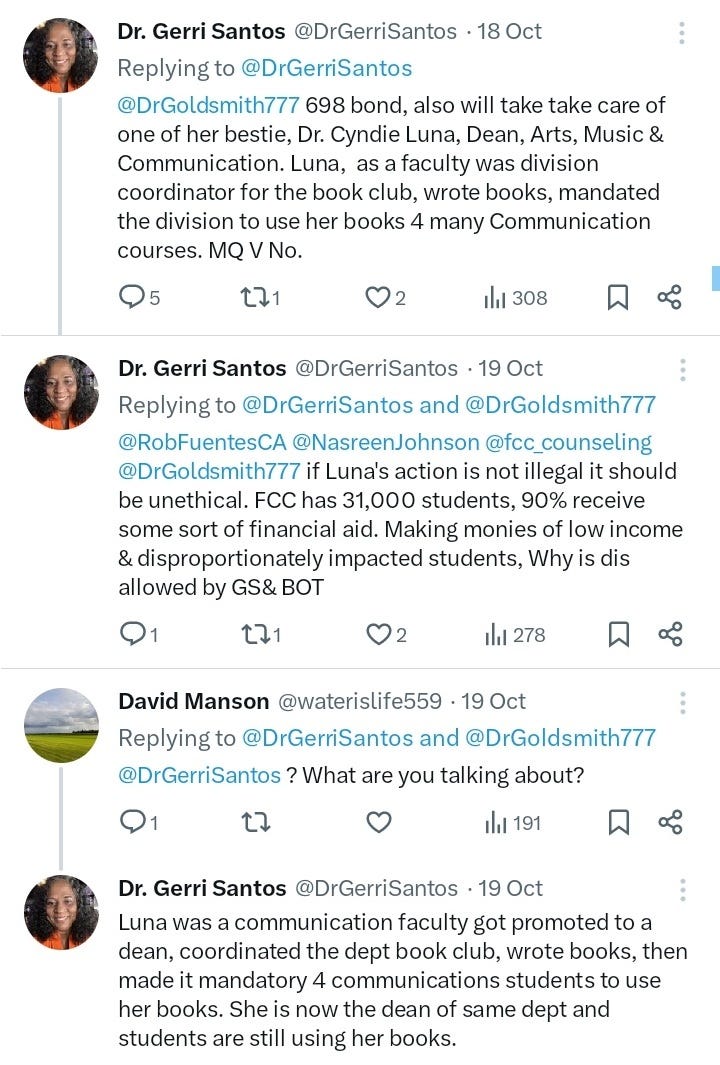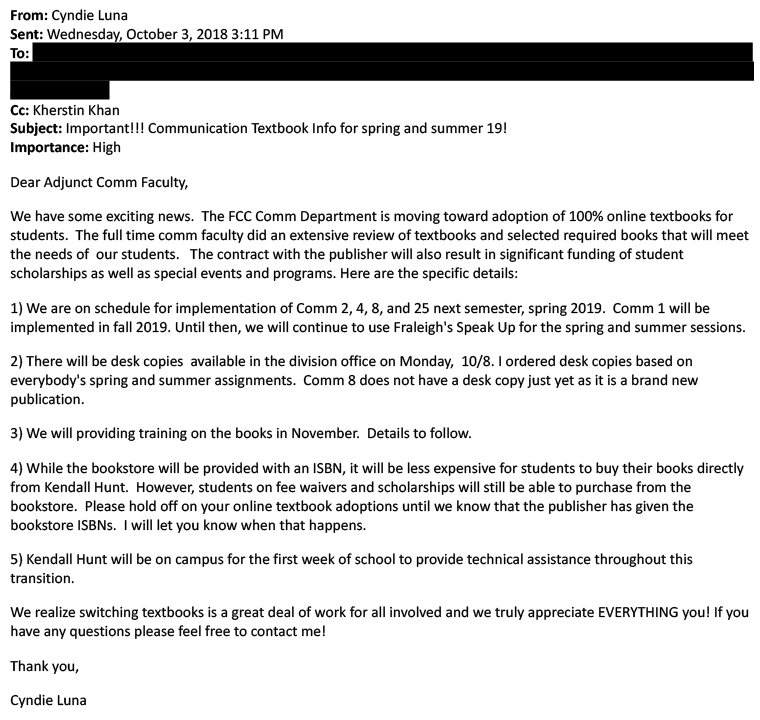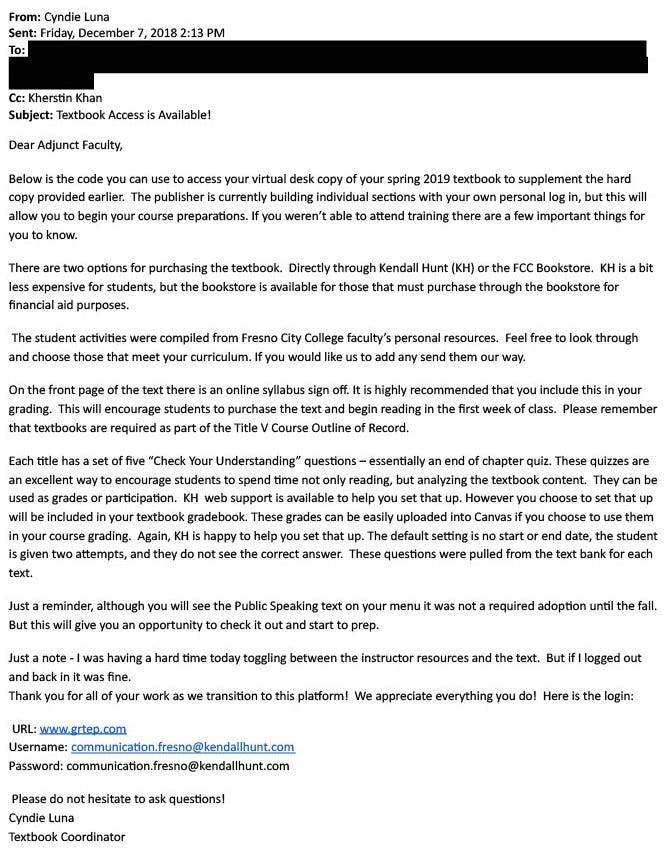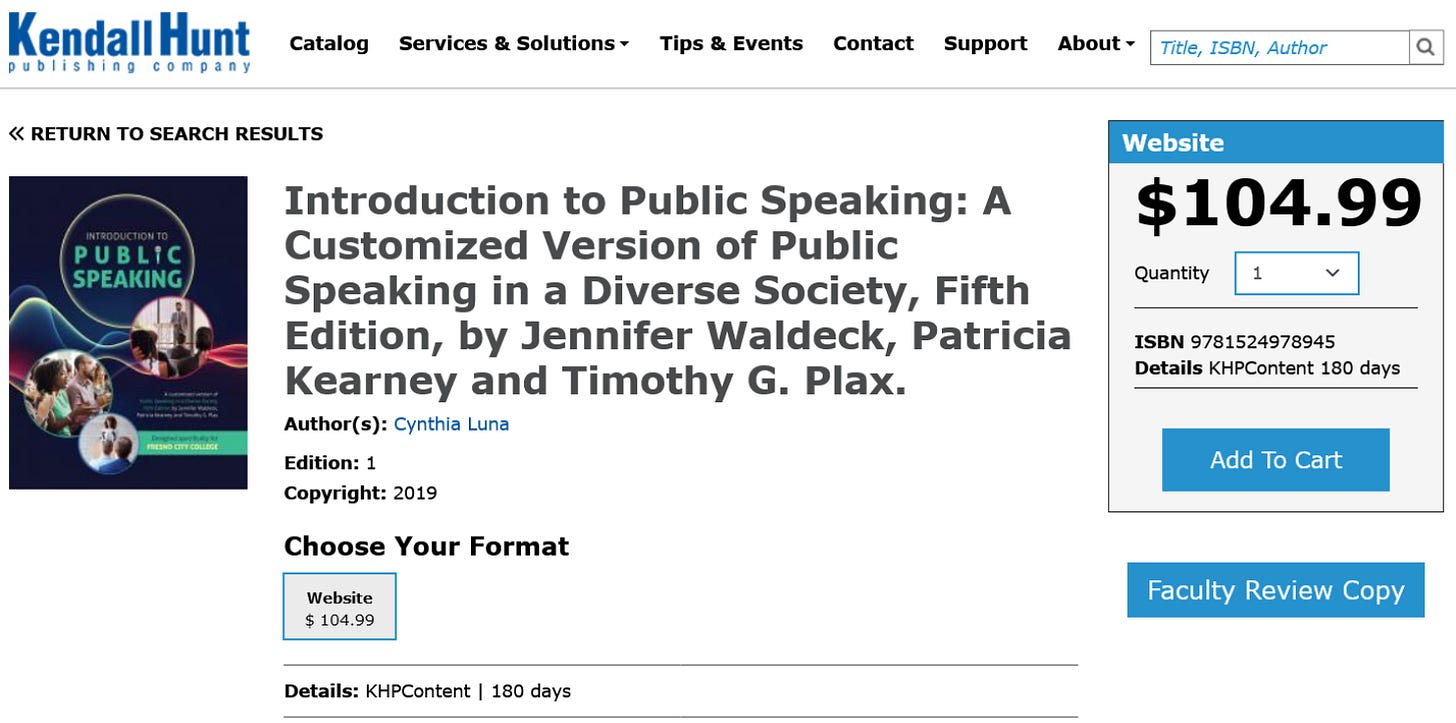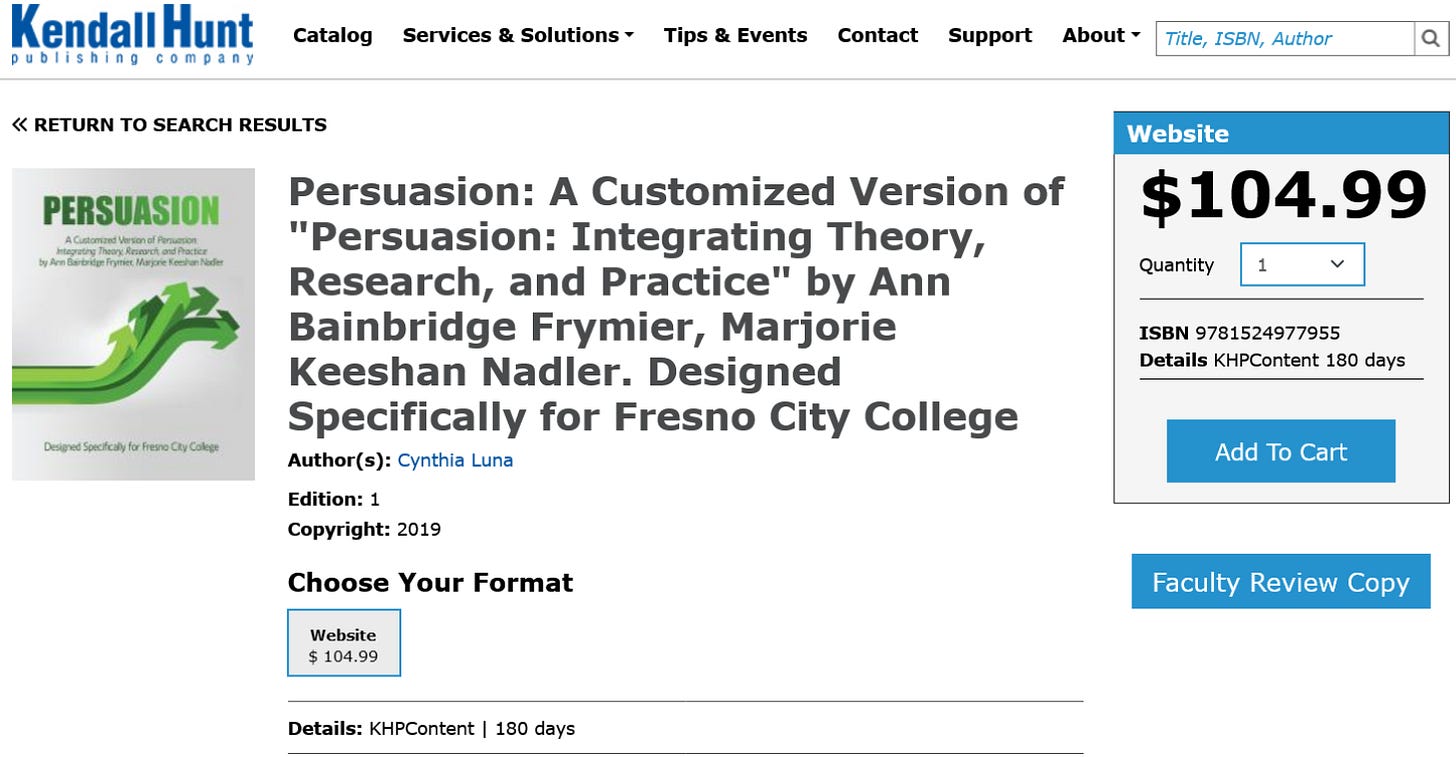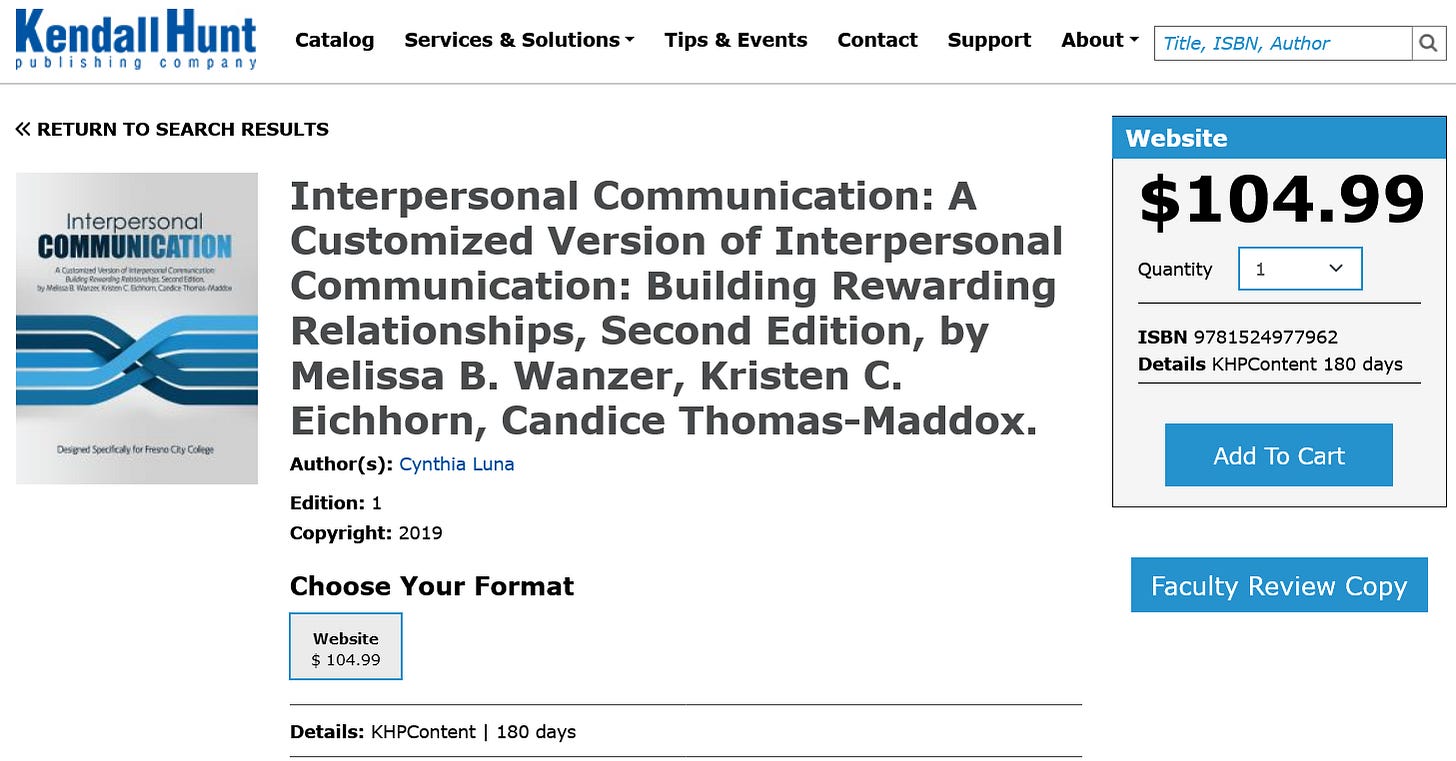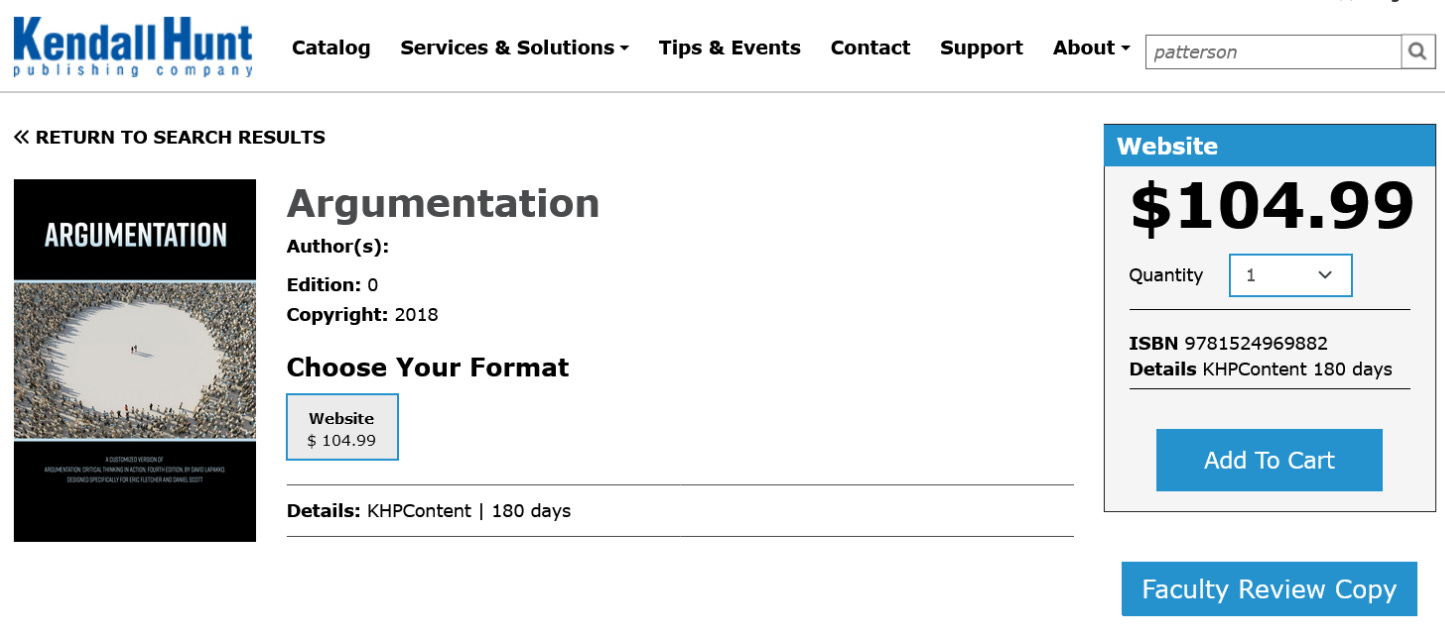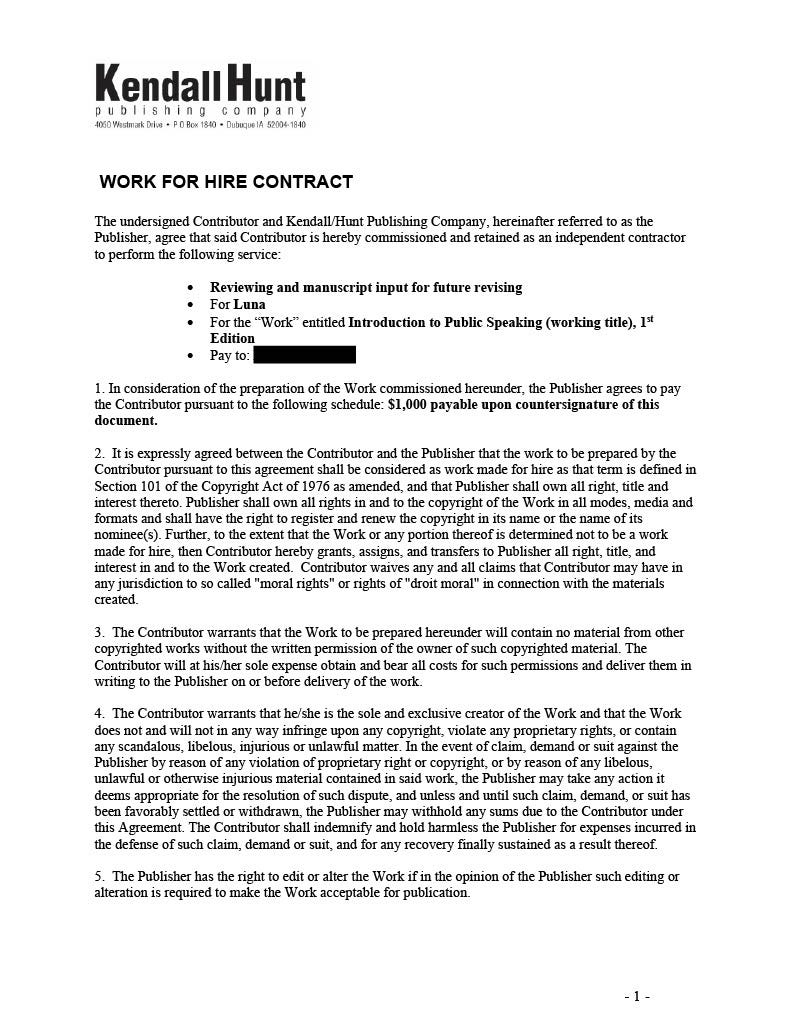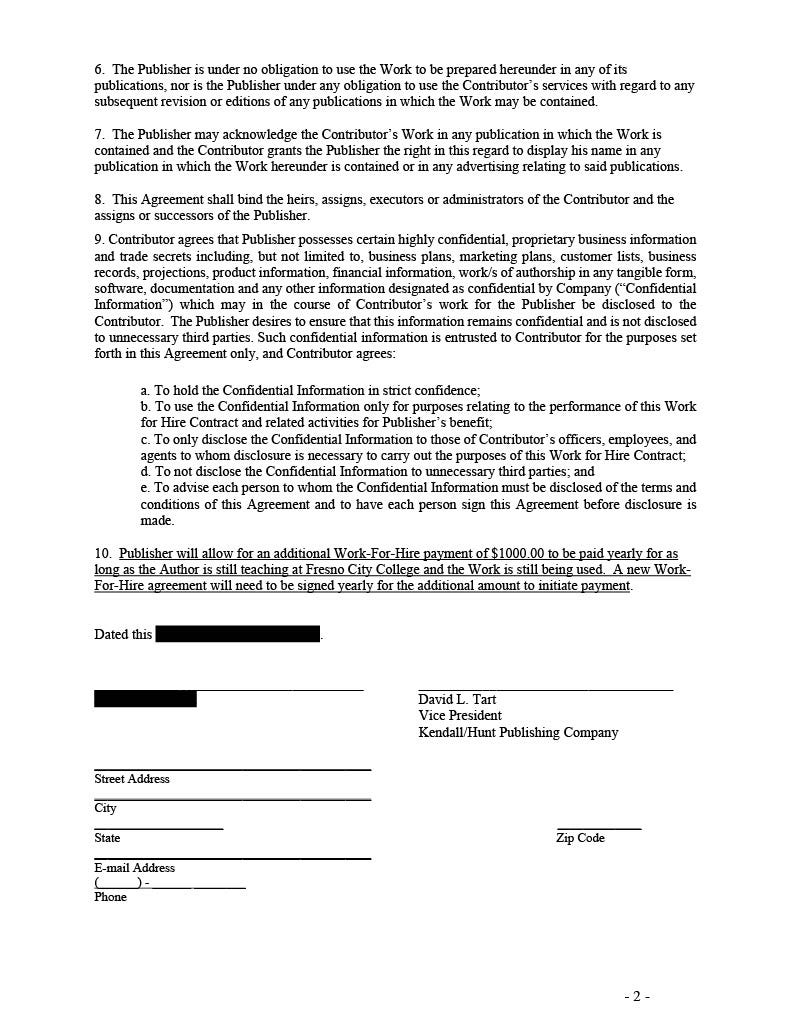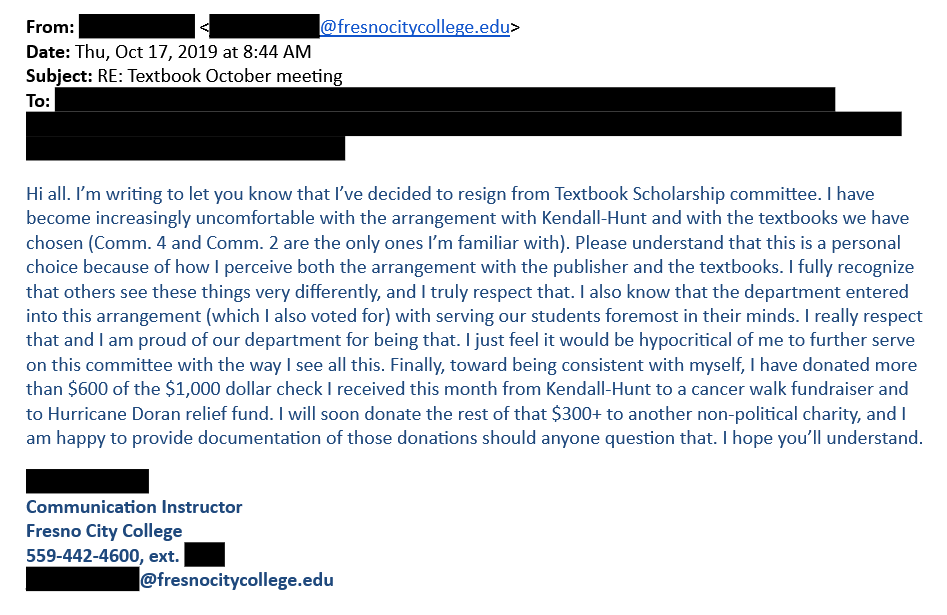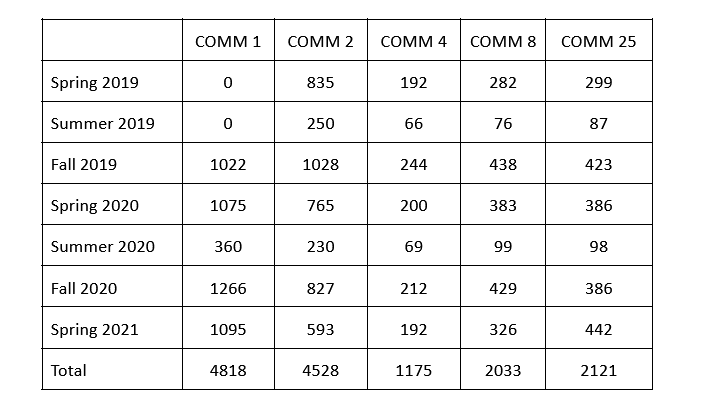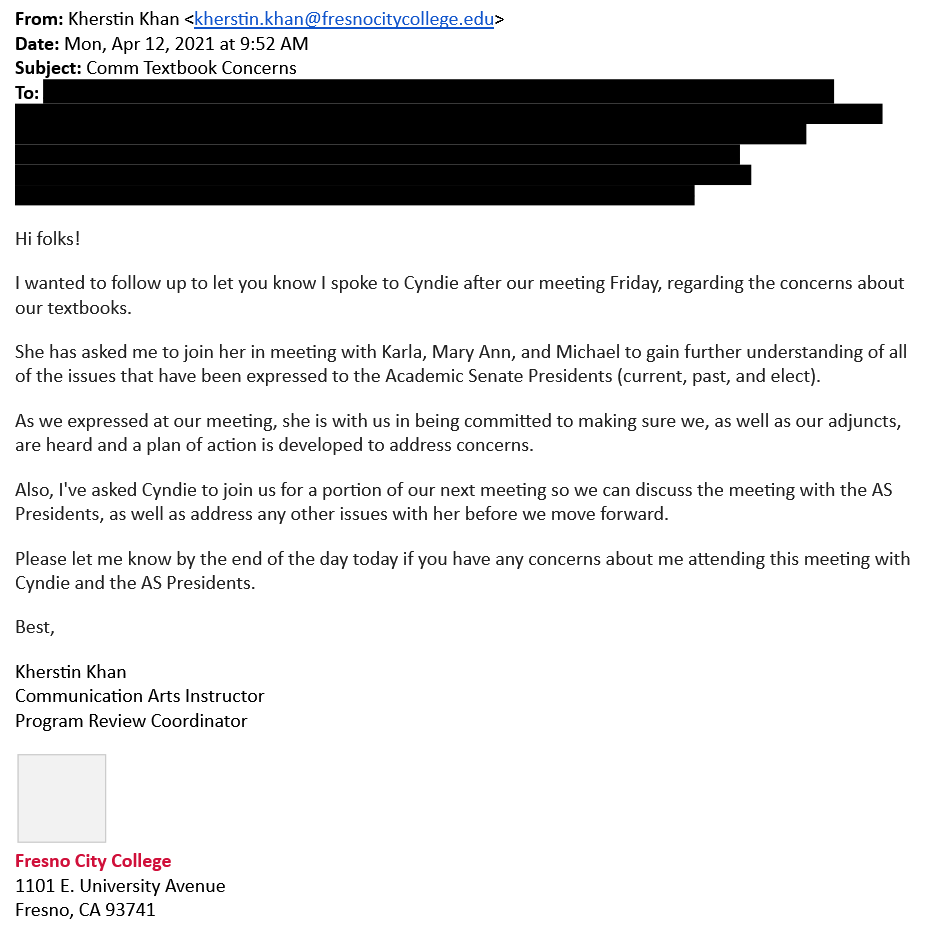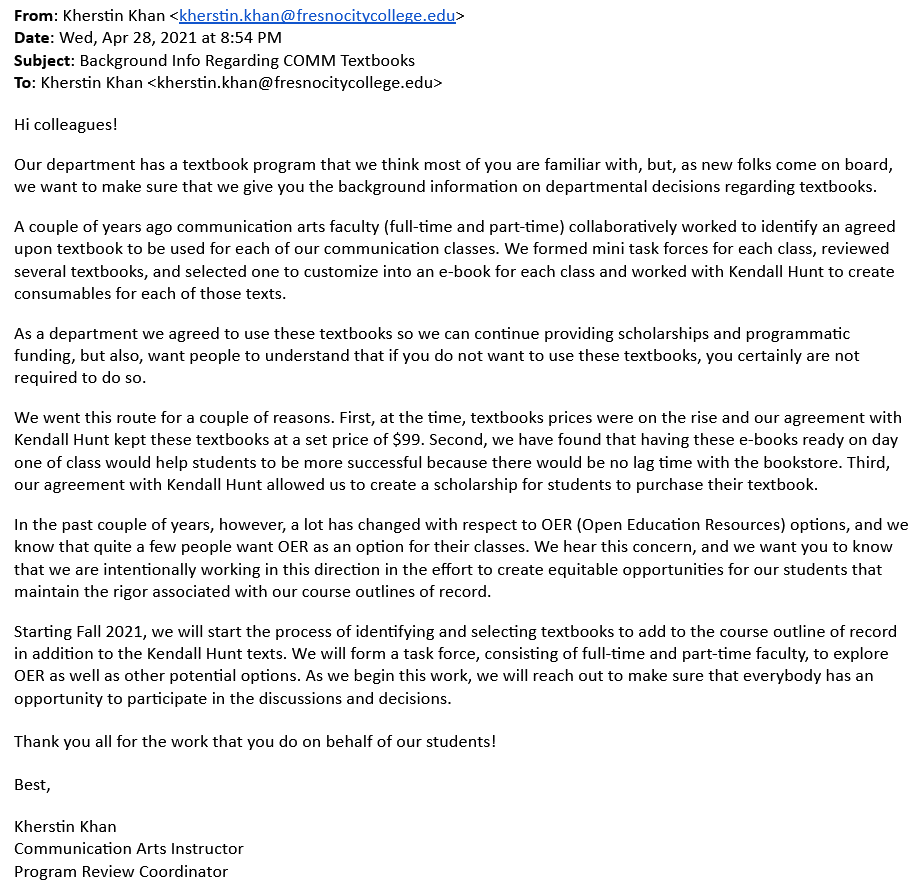Textbook Mandate of the Communication Department at Fresno City College: Part 1 of 3
Profiteering at the expense of students at Fresno City College.
“Nauseating!”
That was the word one of our team members exclaimed upon fully understanding the scope and impact of the communication department’s textbook mandate on students. The revelation was deeply unsettling for all of us, especially considering the significant financial burden it placed on the very students the institution is meant to serve.
This investigation began on October 18, prompted by a post from Dr. Gerri Santos that highlighted a troubling arrangement involving Dr. Cyndie Luna and a textbook mandate within Fresno City College’s (FCC) communication department. What started as a single social media post soon snowballed into a much larger and more troubling story.
One thing we’ve learned about Dr. Santos is this: when she speaks out and we dig deep enough, we usually strike gold. This time, however, what we uncovered wasn’t gold—it was filth.
This investigation has consumed over 100 hours of relentless effort from our team, spanning nights and weekends. We’ve drawn insights from more than 30 sources, examined hundreds of pages of evidence, and engaged in many hours of discussion to untangle this intricate and troubling narrative. What emerged is a story that demands to be told, no matter how unsettling the truth may be. This is the first installment of a three-part series where we will share the findings of our investigation into these textbooks.
Fear of Retaliation
A recurring theme among our sources is the pervasive fear of retaliation by Dr. Luna and Chancellor Goldsmith. Many pointed to the close relationship between the two as a significant factor driving this fear. One source shared that they were explicitly warned by multiple individuals not to speak out against Dr. Luna due to her close ties to Chancellor Goldsmith—a sentiment echoed by others. When we asked why this situation had persisted for so long, our sources consistently pointed to this relationship as a potential shield for Dr. Luna’s actions.
The fear of retaliation is not without basis. We were pointed to individuals who had allegedly faced serious consequences for speaking out against the matter. Despite our efforts to contact them directly and through intermediaries, they understandably chose not to cooperate. We respect their decision but remain hopeful that this story will inspire them to share their experiences with us.
While we have been investigating this story for more than a month, it wasn’t until our reports were published—and demonstrated our unwavering commitment to source protection—that some individuals felt secure enough to collaborate with us. To safeguard their identities, we have advised our sources to deny any involvement with this investigation, thereby minimizing their risk of retaliation. As always, we remain steadfast in our commitment to protecting our sources, ensuring their safety and confidentiality above all else.
The Textbook Mandate
During her tenure as a faculty and chair of the communication department at FCC, prior to her promotion to the Dean of the Fine, Performing, and Communication Arts division (FPCA), Dr. Cyndie Luna spearheaded a partnership with Kendall Hunt, a national textbook publisher. This collaboration resulted in the development and mandatory implementation of required textbooks for nearly all communication courses at FCC.
When the mandate went into effect, the communication department offered the following courses: COMM 1, COMM 2, COMM 4, COMM 8/8H, COMM 25, COMM 26. Of these, all courses except COMM 26 usually had textbooks. Historically, faculty in the communication department enjoyed the academic freedom to independently select course materials without restrictions, as is the norm across all colleges within the State Center Community College District (SCCCD). However, this changed dramatically in Fall 2018. On October 3, 2018, Dr. Luna sent an email to all part-time faculty in the department, informing them of a significant shift in textbook policy.
Key points from the email relevant to this story include:
The textbooks are entirely online.
They are mandatory and selected by full-time faculty.
A contract with the publisher generates funds for scholarships, events, and programs.
The textbooks for COMM 2, 4, 8, and 25 were implemented in Spring 2019, while the textbook for COMM 1 was implemented in Fall 2019.
Our investigation into the mandated nature of these textbooks was exhaustive, driven by the need to address conflicting narratives. Two sources familiar with a meeting between Dr. Luna, Kherstin Khan (chair of the department in the Spring of 2021), and some members of the Academic Senate’s executive committee in the Spring of 2021, reported that both Dr. Luna and Ms. Khan insisted that the textbooks were not mandated. We rarely make definitive statements in our articles, but the depth of our fact-finding leaves no room for doubt. Through rigorous investigation and review of emails, text messages, historical syllabi records, and testimonies of current and former faculty, we uncovered extensive evidence confirming that these textbooks were indeed mandated and that this mandate was actively enforced.
Furthermore, in a different email to faculty, Dr. Luna states, “Please remember that textbooks are required as part of the Title V Course Outline of Record”.
To investigate this claim, we consulted experts familiar with Title V, a U.S. Department of Education program providing grants to Hispanic-Serving Institutions. They told us that Title V does not mandate any textbooks. They suspected that the author likely referred to Title 5 of the California Code of Education. We reached out to experts familiar with that regulation. They too were mystified and told us they were not aware of such requirement under Title 5. This raises significant questions about the validity of the justification provided by Dr. Luna.
The Textbooks
Each textbook was priced at approximately $100, a cost that some faculty members within the District argued was unjustified given the quality of the content and its entirely digital format. To assess these claims, we consulted several communication faculty outside the District. Their feedback was consistent: the $100 price point was unreasonably high for four of the textbooks, particularly given the absence of printing costs for digital materials and the limited functionality offered by the online format.
The issue became even more glaring when we compared the cost of the COMM 1 textbook to the same course at Fresno State, COMM 3, during the same period of time (they have different numbers but the courses are exactly the same). At Fresno State, textbooks for this course were not digital and averaged $49, peaking at $69, and were available in used format, allowing students to sell them after completing the course. A large number of faculty at Fresno State were using Open Educational Resources (OERs) that are free to students. In contrast, the digital nature of FCC’s textbooks, combined with single-use access codes, prevented students from purchasing cheaper used versions or recovering any of their costs by reselling the books.
Our investigation revealed that the field of communication, particularly for community college courses, had access to a robust selection of OERs, significantly more than many other disciplines. Notably, many communication faculty and departments in the California Community College system began transitioning to OERs in 2018 and 2019—the same period when FCC’s communication department was implementing costly, mandatory textbooks.
The mandated textbooks in the FCC communication department were exclusively digital, requiring students to purchase single-use access codes. Once registered to a specific class, these codes could not be reused, resold, or purchased on the used book market, effectively forcing every student to buy a new code. This ensured a steady revenue stream for the publisher, the authors, and the department.
This stark difference highlights the additional financial burden placed on FCC students and raises questions about the rationale behind mandating such costly, restrictive materials. Furthermore, we discovered that shortly after the mandate was lifted at the end of Spring 2021, many faculty stopped using the textbooks, except for one course, COMM 8. This shift strongly suggests that the perceived value of these textbooks by faculty did not justify their high price.
Making of the Mandate
We questioned how the majority of faculty could have supported mandating required textbooks, particularly given the significant financial burden this placed on students. We discovered that part-time faculty were largely excluded from the decision-making process. Our investigation indicates that Dr. Luna was allegedly the mastermind behind this textbook scheme. She coordinated all communication between Kendall Hunt and the department, orchestrated the financial and logistical aspects of the deal, and controlled its enforcement. She even referred to herself as the “textbook coordinator” in emails.
Dr. Luna orchestrated the scheme in collaboration with three senior full-time faculty members, all of whom financially benefited from the mandated textbooks through royalties as so-called “authors”. For now, we will refer to them as “authors”, but in our next article, we will delve into why they may not have truly earned that title.
Dr. Luna marketed the scheme to the full-time faculty in the department as both a cost-saving measure for students and a source of income for the department. However, as we have described the claim of reducing costs for students was far from accurate, but her promise to generate revenue for the department did come to fruition. The authors failed to disclose their financial interests in the textbooks to the department, part-time faculty were completely excluded from the discussions, and several full-time faculty reported feeling pressured to support the mandate without fully understanding its serious implications on students.
The official decision and vote to mandate the textbooks was allegedly made during the final department meeting of Spring 2018. Despite our attempts to obtain the meeting minutes and related documents through multiple sources, the records appear to have mysteriously disappeared. Nearly all full-time faculty who spoke with us, stated that the financial incentives for the authors were never disclosed. Many expressed that they felt pressured to agree to the arrangement without being provided adequate details, a sentiment universally echoed across those we interviewed.
In addition to royalties paid to the authors, the department itself received significant financial compensation from the arrangement for every book that was sold. Our sources told us that Kendall Hunt would send the department large checks two or three times a year. These checks allegedly ranged between $10,000 and $25,000.
Records indicate that a portion of the funds generated from the textbook mandate was initially used to fund an endowment account, which to this day generates interest for the department. Once the contribution window of the endowment closed, the department used the following percentages to split the money: 45% was allocated to the communication program account, 40% to a scholarship account, and 15% to the Obanion account. To the best of our understanding, the Obanion account is a foundation account used by the speech and debate team. We will delve deeper into the scholarship account in our next article. The communication program account, however, is managed at the discretion of the Dean, in this case Dr. Luna.
The financial incentives resulting from the textbook agreement was substantial, to the extent that every full-time faculty in the communication department utilizing these textbooks in their courses, which was all of them, received an annual stipend of $1,000 from the publisher, ostensibly for their “contributions” to the textbook. However, we learned that allegedly there were little to no contributions. It became evident to some faculty that this stipend functioned more as an inducement from the publisher to ensure faculty mandated these textbooks in their classes and to guarantee student purchases.
After part-time faculty members raised concerns about the arrangement, financial incentives were extended to them as well, further complicating the ethical landscape of the deal. Dr. Luna informed the faculty that the publisher would pay $250 per semester to any part-time faculty member who “work the quizzes into their graded curriculum”.
Offering financial incentives to part-time faculty to incorporate end-of-chapter quizzes into their grading was perhaps the most insidious tactic in this entire scheme. This approach effectively ensured that every student was forced to purchase the textbook or risk their grades suffering as a consequence. Furthermore, sources indicated that these quizzes were only 5 multiple-choice questions and allegedly provided little to no educational value. Multiple faculty told us the quizzes appeared to have been created as a mechanism to ensure the purchase of these textbooks.
All full-time faculty members we spoke with expressed regret for participating in the scheme. Though the program was initially approved by the full-time faculty, several of them expressed regret, discomfort, and discontent with it. Notably, two of the four authors reportedly withdrew from the arrangement and forfeited their share of royalties. Another full-time faculty member even sent an email to the department expressing discomfort with the arrangement, further highlighting the internal dissent this mandate caused.
This growing unease underscores the significant ethical concerns surrounding the mandate and its troubling impact on both students and the department.
Experts we consulted attributed the excessive cost of the mandated textbooks at FCC to the royalties and financial incentives provided by the publisher to the authors, faculty members, and the department. As they pointed out, there is no such thing as free money—every dollar paid to the authors, faculty, and department ultimately came directly from the students’ pockets.
The Golden Four
What makes this story particularly hurtful—and almost personal to us—is the way such a critical department was exploited for profit. The communication department holds a unique place as part of the "Golden Four" (Math, English, Communication, and Critical Thinking), meaning nearly every student who attends FCC is required to take a course from this department. As a result, almost every FCC student was compelled to purchase one or more of these mandated textbooks, making the department’s actions all the more troubling.
It is profoundly troubling to witness the department funding its accounts and faculty profiting at the expense of students, especially those required to take communication courses to fulfill their General Education (GE) requirements. This practice raises serious ethical concerns, as it places departmental and personal financial gain above the well-being of the very students the institution is meant to serve.
At an institution where, in the 2023-24 academic year, the campus food pantry saw 146,146 visits from 10,124 unduplicated students, and over 67% of the 39,007 enrolled students are classified as low-income, it is deeply unethical for the department and faculty to profit at the expense of these already financially strained students.
According to our sources, a full-time faculty member in the department argued that since students receive financial aid and own expensive phones, they should be able to afford the textbook and prioritize their spending. This comment reveals a significant disconnect and a troubling lack of understanding about the financial hardships many students endure. When discussing this mindset with our sources, some pointed to the racial composition of the faculty in the department as a factor worth examining further.
The Numbers
It is difficult to tell how much money Dr. Luna, the other authors, and the communication department made without having access to financial documents. However, enrollment data for communication courses at FCC, publicly accessible on the Data Dashboard, provides detailed student headcounts per course for each semester during the period when these textbooks were mandated. The table below presents the data we compiled. Enrollment figures for COMM 1 in Spring and Summer 2019 are listed as zero, aligning with Dr. Luna's email indicating that the textbooks would not be implemented until Fall 2019. However, records show that some faculty began adopting the COMM 1 textbook earlier—a point worth noting, though not the primary focus of this article.
Let us be clear: authoring a textbook and earning royalties is not inherently unethical. However, using one’s position within a department to mandate overpriced textbooks for nearly 15,000 students—without disclosing financial incentives—and then exerting pressure on part-time faculty, a vulnerable group reliant on the goodwill of the Dean and full-time faculty, to comply with the mandate in order to inflate personal and departmental profits at the expense of students is undeniably unethical. This is the focus of our article.
If every student purchased the textbook for every class—a scenario unlikely until end-of-chapter quizzes were incorporated into grading—approximately 14,675 students would have purchased these books during the mandate period. Through sources and proxies, we learned that the royalty rates for the three other authors were allegedly between 10% and 20% of the sale price, equating to approximately $10 to $20 per book sold at $100. However, Dr. Luna's royalty percentage was reportedly much higher due to her pivotal role as the publishing company’s campus agent. A source with significant knowledge of the matter suggested her royalty rate could have been as high as 50%, or $50 per book sold.
Dr. Luna was the sole author for COMM 1, COMM 2, and COMM 4 and coauthored COMM 8. Two other faculty members coauthored COMM 25. Based on these roles, if every student purchased the textbook during the mandate period:
Dr. Luna’s estimated royalties: Between $115,375 (at a 10% royalty) and $576,875 (at a 50% royalty).
Total royalties for the three other authors combined: Between $31,375 (at a 10% royalty) and $156,875 (at a 50% royalty).
Based on the evidence and patterns we reviewed, we believe it is more realistic that Dr. Luna allegedly received royalties between 30% and 50%, reflecting her instrumental role in mandating the books and acting as the “textbook coordinator”. The other three authors likely earned royalties between 10% and 20%. Additionally, there were allegedly volume bonuses in the form of percentage multipliers, further increasing profits for those involved. We want to remind you that absent access to financial records, we can not confirm the exact numbers.
The Enforcement
Dr. Luna allegedly enforced the textbook mandate using data provided by Kendall Hunt, which tracked textbook purchases and registrations for each class. According to credible sources, Kendall Hunt regularly communicated the number of books sold and registered for all the classes to Dr. Luna. This level of tracking was possible because there was no physical textbook; students were required to purchase an envelope from the bookstore containing a unique code, which they then registered to their class. This process allowed Kendall Hunt to monitor exactly how many students in each course had purchased and registered the code.
Kendall Hunt reportedly shared these figures with Dr. Luna, who would then “check” on the courses. We spoke with several faculty members, particularly part-time faculty, who recounted receiving communication from Dr. Luna or others inquiring about low textbook sales in their classes and emphasizing the required nature of the textbooks. This level of scrutiny further underscores the pressure placed on faculty to comply with the mandate, raising serious concerns about academic freedom and the ethics of this arrangement.
One source recounted raising concerns about how mandating textbooks might violate faculty’s academic freedom with a full-time faculty member. After questioning the mandate’s legitimacy, the source was allegedly warned that part-time faculty who “create problems” would face consequences, adding that the department doesn’t hire people for full-time positions who don’t align with department’s values.
Another full-time faculty member allegedly told a source that faculty are required to teach using only department-approved textbooks, and if anyone wanted to use a different book, they would need to submit it for approval—implying a cumbersome process meant to discourage deviations from the mandate.
Some faculty told us that, despite not using the textbook in their classes, they still required students to purchase it due to the immense pressure placed on them. This troubling dynamic highlights the coercive environment fostered within the department.
Our sources and the records we reviewed indicate that when faculty inquired about using alternative textbooks, even OERs that are free to students, they were explicitly told by Dr. Luna, the chair of the department, and other department leaders that there was a five-year contractual obligation with Kendall Hunt, effectively sidelining efforts to adopt more cost-effective, student-friendly options. We will delve into the specifics of this "five-year contract" in our second article.
Mandate? What Mandate?
In Spring 2021, a few communication faculty took their complaints about the textbook mandate and the price of the textbooks to the Academic Senate. This prompted the President of the Senate to reach out to the chair of the communication department, Kherstin Khan, to address the issue and requesting a meeting. In response, Ms. Khan raised the matter during a department meeting and was tasked by the department to attend the meeting. Subsequently, Ms. Khan emailed the full-time faculty, informing them that Dr. Luna, now the Dean and someone who should not interfere with faculty textbook selection, had requested to join the meeting with her.
When we saw this email, we could hardly believe our eyes. The very individual who stood to gain the most financially from the department maintaining the textbook mandate had requested to join the department chair in addressing the concerns with the Academic Senate. The blatant disregard for even the pretense of ethical behavior was staggering.
According to sources familiar with the meeting, both Ms. Khan and Dr. Luna were allegedly visibly upset about the issues being raised and emphatically denied that any mandate existed—a claim that is laughable in light of the overwhelming evidence we have gathered. Under pressure, they eventually agreed to send an email to all department faculty, explicitly stating that the use of the textbooks was not mandated.
Why?
We spoke to numerous individuals in an effort to understand how such blatant profiteering at the expense of students was allowed to occur. How could such overt actions go unchecked? The only answer we consistently encountered was the culture of impunity fostered among close associates of Chancellor Goldsmith. Dr. Luna, in particular, allegedly felt shielded from any repercussions due to her close relationship with Chancellor Goldsmith, first as the President of Fresno City College and later as the Chancellor.
That brings us to the Board of Trustees.
A Word for the Board
Were you aware of this issue when you passed Resolution No. 2022.36 about textbook costs? According to our sources, the communication department textbook issue was an “open secret” on the FCC campus. It seems you’ve become so disconnected from your own colleges that a widely discussed issue spanning nearly five years has evaded your attention.
Are you aware that your sole employee frowns upon others contacting you? How often have you engaged directly with your college’s Academic Senates, Classified Senates, and Associated Student Governments? Perhaps your disconnection from campuses is why many are resorting to innovative channels like this to ensure their voices are heard.
By now, it should be evident to you, the Board of Trustees, that our articles are growing increasingly revelatory and this trend will continue. We think the public has the right to know how their elected official are turning their head away from a toxic culture of retaliation and cronyism created by their only employee. At some point, you must address the problem.
As we have detailed, Chancellor Goldsmith has fostered a culture where those close to her not only benefit significantly from their relationship with her but operate with a sense of impunity, free from accountability. Meanwhile, those who she perceives as opposition, face threats and retaliation. This troubling dynamic is not mere speculation—it has been substantiated by the overwhelming support we have received, the numerous individuals who have reached out to share their experiences and evidence, the District’s ever expanding legal cost, and the expanding readership of our stories.
It is your continued inaction that has allowed this toxic environment to persist. Our work exists as a direct response to that inaction. We firmly believe that Chancellor Goldsmith is not the right person to lead this District. Meaningful reform is urgently needed to address and undo the toxic culture of fear and intimidation she has fostered. This culture did not emerge overnight and it will not disappear overnight. However, the first and most critical step in this process is for you to take decisive action and show students, faculty, classified and administrative professionals, and more importantly the public that you care about the health of this institution and take your fiduciary responsibility seriously.
Dr. Goldsmith, with her background in history, can attest that paranoia is the affliction of despots. As our network of sources within the colleges and the District office continues to grow, the Chancellor and her allies will find it increasingly difficult to operate without scrutiny. Every action she takes, every word she speaks, and every directive she issues through her inner circle will be subject to our investigation. She will never know who she can trust and the uncertainty will only grow. Sooner or later, she begin taking even more heavy handed measures which feeds our stories. While she has harmed many, even some of her closest allies have come to recognize that she is not the right person to lead our district—and they are now working with us.
Our Updated Promises:
As you recall, we promised to include your name in our publications ensuring that your inaction and failure to meet your fiduciary responsibilities are permanently etched in digital archives for future scrutiny:
-Magdalena Gomez
-Danielle Parra
-Robert A. Fuentes
-Austin Ewell
-Deborah J. Ikeda
-Nasreen Johnson
-Destiny Rodriguez
-Haiden del Fierro
If you recall, we distributed our previous article to 25 news organizations, and promised to share this one with the same outlets along with an additional 25 organizations. True to our word, this article was sent to all 50 outlets the moment it was published.
New commitment: Starting with this article, we will be sending our findings to 25 presidents, chancellors, and trustees in the region. Our next article will be shared with these 25 individuals as well as an additional 25, expanding our reach and ensuring greater accountability.
Stay tuned for Part 2.
State Center Community College District (SCCCD) - Fresno City College (FCC) - Madera Community College (MCC)- Clovis Community College (CCC) - Reedley College (RC) - Dr. Carole Goldsmith - Chancellor Goldsmith - Cyndie Luna




